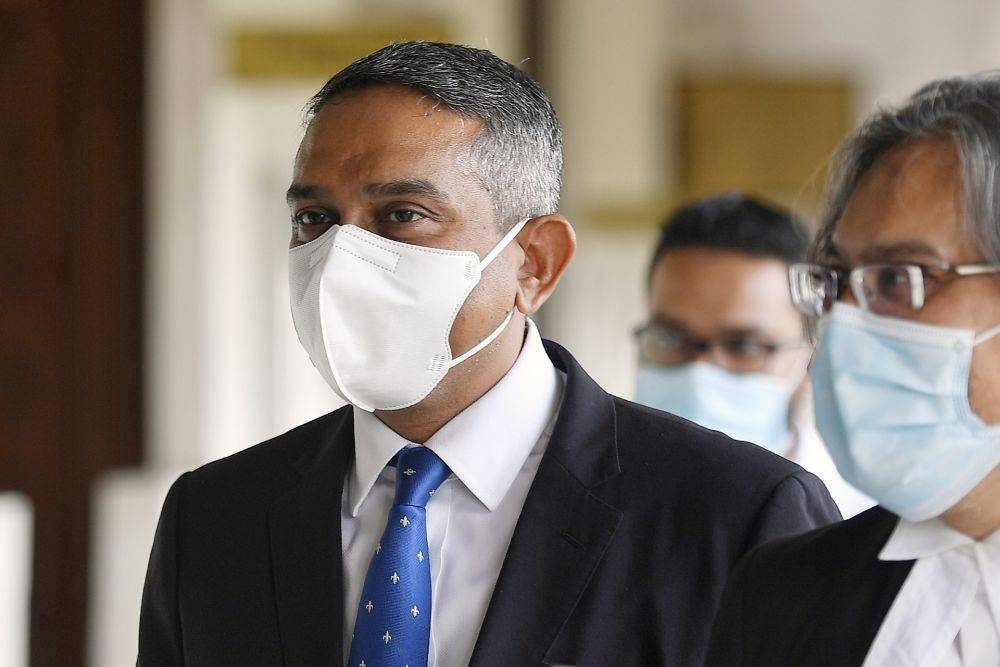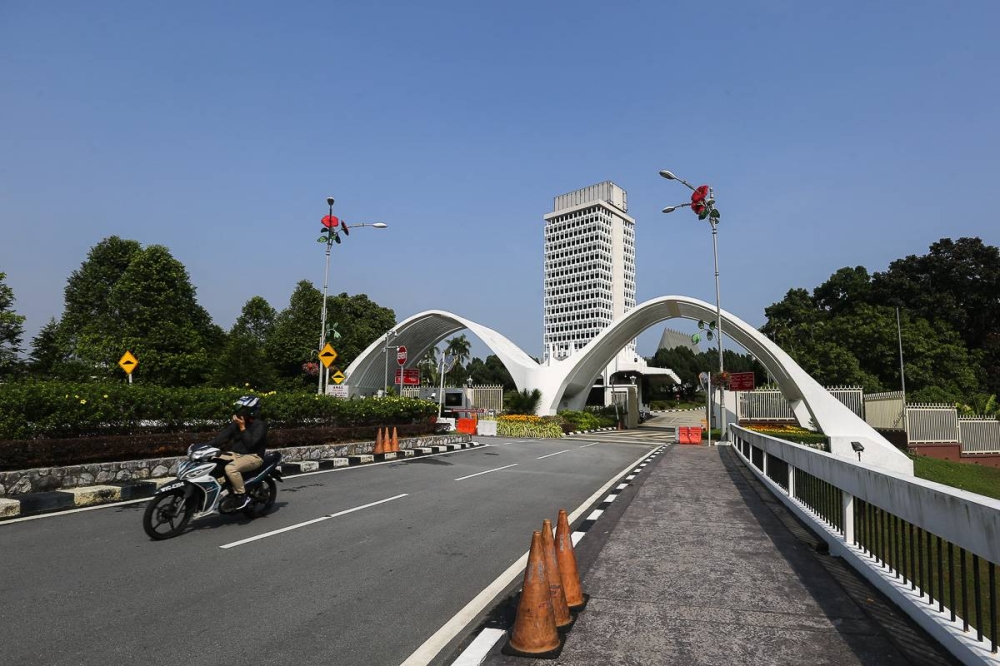KUALA LUMPUR, Oct 28 — The High Court today allowed the government’s application to strike out immediate incumbent Klang MP Charles Santiago’s lawsuit — which had sought to stop the 15th general election (GE15) from being held due to an alleged invalid request from then prime minister Datuk Seri Ismail Sabri Yaakob to dissolve Parliament.
Among other things, High Court judge Datuk Ahmad Kamal Md Shahid based his decision on his views that Ismail Sabri need not ask his Cabinet before requesting the Yang di-Pertuan Agong to dissolve Parliament.
“The prime minister’s power to request for the dissolution is a non-justiciable subject matter. Being the head of the executive, his request to dissolve Parliament does not need the consultation of the Cabinet members. The decision to dissolve Parliament is entirely his.
“Therefore, it is my judgment, the plaintiff’s originating summons is obviously scandalous, frivolous, or vexatious and an abuse of the court process. Hence it should be struck out,” he said when delivering the brief grounds of his decision via the video-conferencing platform Zoom.
The judge had also said the lawsuit by Charles should be struck out, as he viewed the matter of the proclamation of Parliament’s dissolution and the dissolution of Parliament itself to be “non-justiciable” subject matters, or matters which the courts cannot decide on.
Earlier, the judge had said that the decision-making process leading to a “non-justiciable” matter — such as Parliament’s dissolution — should also be non-justiciable, stating that this meant the validity of the prime minister’s request to the Yang di-Pertuan Agong for Parliament’s dissolution should also be non-justiciable or not something the courts can decide on.
The judge agreed with constitutional scholar Emeritus Professor Datuk Shad Saleem Faruqi’s views in the book “Our Constitution” that the prime minister has the powers to decide matters to be discussed by the Cabinet and is not bound by Cabinet’s advice, also agreeing with the latter’s view that the prime minister need not consult Cabinet for budget proposals, foreign policy initiatives or in advising the monarch for Parliament’s dissolution.
“I view that since the sole and ultimate power to request for the dissolution of Parliament lies solely in the hand of the prime minister, the contention of the plaintiff challenging the validity of the request to dissolve Parliament is of no merit,” the judge said, referring to Charles as the plaintiff.
Viewing the prime minister to be the “ultimate power in the executive” branch of government, the judge added: “He can decide to make a request for the dissolution of Parliament without the advice of his Cabinet. And ultimately, the Yang di-Pertuan Agong has the discretion whether to accede or to reject the request for the dissolution under Article 40(2)(b) of the Federal Constitution,” the judge said, before concluding that the case should be struck out.

While the government’s lawyer Datuk Mohd Hafarizam Harun had sought for costs of RM200,000 to be paid, the judge said such a proposed amount was “quite high and excessive” and eventually ordered Charles to pay costs of RM20,000 to the government, Ismail Sabri and the Election Commission (EC).
In seeking for RM200,000 in costs as “appropriate compensation”, Hafarizam argued that the case had attracted interest from civil society and the media, later claiming that this was not a case of public interest but was allegedly only a case that the public is interested in.
“And My Lord, if we are to just give no order as to costs, it will not stop the floodgate of vexatious litigants coming to court under the cloak of public interest, when it is actually what the public is interested in, either political or not,” Hafarizam argued as he urged the court to send a clear message against cases of such nature being brought to court.
But Malik Imtiaz Sarwar, one of the lawyers for Charles, firmly objected to his client being ordered to pay any costs.
Imtiaz argued that this case was clearly in the public interest as it has enabled the High Court to bring some clarity to this area of constitutional law, and noted that today’s decision was the first such court judgment on Article 42 of the Federal Constitution.
“It has brought some certainty to this area, rather than punish my client with costs, I think my client should be commended for the fact that he brought this proceedings to seek clarity in a public-spirited manner,” he argued.
Imtiaz also said it was unfounded for Hafarizam to suggest that Charles is a vexatious litigant as a court case can be ruled as an abuse of process despite the good intention of those involved, and pointed out that this is not a clear cut case where there would be no basis but was instead a case with complex issues.
Imtiaz also questioned Hafarizam’s suggestion of “floodgates” when there were only two court cases currently regarding this issue, saying: “What he is trying to say, individual citizens who are trying to seek accountability should be punished so they don’t come to court for relief.” Imtiaz argued that there should be access to justice, and asked for his client to not be ordered to pay any costs.
After having considered the views from both lawyers, the judge noted that it is the court’s discretion to decide on costs, while also highlighting that those who usually file public interest cases do not seek for costs and noted that Charles’ lawsuit had asked for costs if he was successful.
The judge then decided to grant order as to costs and on the RM20,000 amount, having also considered that hearing took half a day, and with the voluminous amount of court documents involved.
When contacted, one of Charles’ lawyers, Surendra Ananth, confirmed to Malay Mail that an appeal will be filed: “Yes, I have been instructed to file an appeal.”
On October 12, Charles filed a lawsuit via an originating summons, naming the three respondents as Ismail Sabri as the then prime minister, the government of Malaysia and the EC.
Charles had sought for several court orders, including a declaration that Ismail Sabri’s request to the Yang di-Pertuan Agong for Parliament’s dissolution was null and void as it was not made based on the Cabinet’s advice or Cabinet’s general authority, and a declaration that the Parliament’s dissolution was not in line with the Federal Constitution’s provisions and was of no legal effect.
Charles had also sought for a declaration that the EC has no legal basis to take any steps for the conduct of a general election, and a court order to restrain the EC from taking any steps to conduct a general election.
Charles was also represented by Yvonne Lim, Wong Ming Yen and Khoo Suk Chyi.
The legal team for the government included senior federal counsel Shamsul Bolhassan, former chief judge of Malaya Tan Sri Zulkefli Ahmad Makinudin, Datuk Abu Bakar Isa Ramat, Norhazira Abu Haiyan and Amin Othman.

Another legal bid to stop GE15 rejected
Just minutes before delivering the decision in Charles’s case, the same High Court judge had also rejected a bid for a legal challenge which was also aimed at stopping the GE15 from happening over Ismail Sabri’s alleged defective request to the Yang di-Pertuan Agong for Parliament’s dissolution.
In delivering the back to back decision via Zoom, the judge refused to grant leave for lawyer Syed Iskandar Syed Jaafar’s lawsuit to be heard.
As Syed Iskandar had filed his lawsuit through a judicial review application, he had to first obtain leave or permission from the court for the actual lawsuit to be heard on its merits.
The judge gave largely similar reasons when reading the brief grounds of his written judgment in rejecting leave, including his view that the matters raised in the lawsuit are not matters that can be heard and decided by the courts.
The judge said Parliament’s dissolution is non-justiciable or a matter that cannot be decided by the courts, viewing this as a matter exclusively for the legislative or executive branch of government and saying that the courts should not entertain this matter.
“This is a matter that is best decided by the people directly involved in calling for the dissolution of Parliament,” he said.
The judge also viewed this court case to be frivolous, as he viewed Parliament’s dissolution to be a decision entrusted to the Yang di-Pertuan Agong’s sole discretion.
Viewing the Yang di-Pertuan Agong to be the “ultimate decision-maker” with the constitutional authority to make a final and non-justiciable decision for Parliament’s dissolution, the judge noted that those sued by Syed Iskandar — Ismail Sabri, the government and the EC — do not have such decision-making powers under the Federal Constitution and said this was why leave cannot be granted for the judicial review.
On October 14, Syed Iskandar had filed a lawsuit via a judicial review application against Ismail Sabri in his capacity as prime minister or caretaker prime minister, the Election Commission (EC) chairman and the government of Malaysia.
Syed Iskandar had sought for several court orders, including a declaration that Ismail Sabri’s request to the Yang di-Pertuan Agong on October 9 for Parliament’s dissolution is null and void and of no effect, and for an order to prohibit the EC from taking any steps to conduct GE15 in furtherance of Parliament’s dissolution.
Syed Iskandar was represented by lawyers Datuk Seri Gopal Sri Ram and R. Kengadharan, while the government was represented by senior federal counsel Shamsul Bolhassan and senior federal counsel Ahmad Hanir Hambaly.
The government did not ask for costs in this case, and the judge did not order Syed Iskandar to pay any costs.
While Sri Ram applied for a stay of the High Court judge’s decision today pending an appeal and with this stay application being objected to by Shamsul, the judge ultimately decided to refuse stay.






















